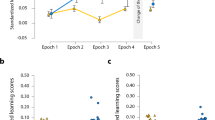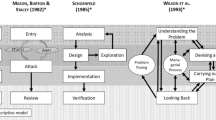Abstract
Numerous studies have focused on developmental differences in practical problem-solving abilities. However, researchers have largely ignored the relationship among age, procedural knowledge, and problem-solving performance. The theoretical model that guided the present investigation suggests that as individuals age, they are exposed to a variety of real-world problems, which in turn should lead to the acquisition of problem-solving scripts. In the present study, a procedurally oriented, practical problem-solving measure was administered to 200 individuals aged 20 to 69 years. For each problem, subjects were required to order a set of discrete behaviors into an optimal solution sequence. These solution sequences were then compared with optimal solutions that domain area experts had established in advance. As expected, age was found to be positively related to prior problem-solving experience. However, contrary to expectations, the quality of subjects' solutions showed slight, negative age differences.
Similar content being viewed by others
REFERENCES
Baltes, P. B. (1993). The aging mind: Potential and limits. The Gerontologist, 33, 580-594.
Baltes, P. B., Cornelius, S. W., & Nesselroade, J. R. (1979). Cohort effects in developmental psychology. In J. R. Nesselroade & P. B. Baltes (Eds.), Longitudinal research in the study of behavior and development (pp. 61-87). New York: Academic Press.
Blanchard-Fields, F., Jahnke, H. C., & Camp, C. (1995). Age differences in problem-solving style: The role of emotional salience. Psychology and Aging, 10, 173-180.
Camp, C. J., Doherty, K., Moody-Thomas, S., & Denney, N. W. (1989). Practical problem solving in adults: A comparison of problem types and scoring methods. In J. D. Sinnott (Ed.), Everyday problem solving (pp. 211-228). New York: Praeger.
Cerella, J. (1990). Aging and information-processing rate. In J. E. Birren & K. W. Schaie (Eds.), Handbook of the psychology of aging (3rd ed., pp. 201-221). New York: Academic Press.
Charness, N. (1989). Age and expertise: Responding to Talland's challenge. In L. W. Poon, D. C. Rubin, & B. A. Wilson (Eds.), Everyday cognition in adulthood and late life (pp. 437-456). New York: Cambridge University Press.
Clancy, S. M., & Hoyer, W. J. (1994). Age and skill in visual search. Developmental Psychology, 30, 545-552.
Cornelius, S. W., & Caspi, A. (1987). Everyday problem solving in adulthood and old age. Psychology and Aging, 2, 144-153.
Craik, F. I. M., & Jennings, J. M. (1992). Human memory. In F. I. M. Craik & T. A. Salthouse (Eds.), The handbook of aging and cognition (pp. 51-110). Hillsdale, NJ: Erlbaum.
Craik, F. I. M., Morris, R. G., & Gick, M. L. (1990). Age differences in working memory. In G. Vallar & T. Shallice (Eds.), Neuropsychological impairments of short-term memory (pp. 247-267). Cambridge, England: Cambridge University Press.
Denney, N. W. (1989). Everyday problem-solving: Methodological issues, research findings, and a model. In L. W. Poon, D. C. Rubin, & B. A. Wilson (Eds.), Everyday cognition in adulthood and late life (pp. 330-351). New York: Cambridge University Press.
Denney, N. W., & Palmer, A. M. (1981). Adult age differences on traditional and practical problem solving measures. Journal of Gerontology, 36, 323-328.
Denney, N. W., & Pearce, K. A. (1989). A developmental study of practical problem solving in adults. Psychology and Aging, 4, 438-442.
Denney, N. W., Pearce, K. A., & Palmer, A. M. (1982). A developmental study of adults'x performance on traditional and practical problem solving tasks. Experimental Aging Research, 8, 115-118.
Denney, N. W., Tozier, T. L., & Schlotthauer, C. A. (1992). The effect of instructions on age differences in practical problem solving. Journal of Gerontology: Psychological Sciences, 47, 142-145.
Ericsson, K. A., & Charness, N. (1994). Expert performance: Its structure and acquisition. American Psychologist, 49, 725-747.
Gentner, D. R., & Stevens, A. L. (1983). Mental models. Hillsdale, NJ: Erlbaum.
Hartley, A. A. (1992). Attention. In F. I. M. Craik & T. A. Salthouse (Eds.), The handbook of aging and cognition (pp. 3-49). Hillsdale, NJ: Erlbaum.
Heidrich, S. M., & Denney, N. W. (1994). Does social problem solving differ from other types of problem solving during the adult years? Experimental Aging Research, 20, 105-126.
Hershey, D. A. (1995). Influence of age and gender on estimates of long-term financial growth functions. Aging and Cognition, 2, 231-250.
Hershey, D. A., Walsh, D. A., Brougham, R., Carter, S., & Farrell, A. (1998). Challenges of training pre-retirees to make sound financial planning decisions. Educational Gerontology, 24, 447-470.
Hershey, D. A., Walsh, D. A., Read, S. J., & Chulef, A. S. (1990). The effects of expertise on financial problem solving: Evidence for goal directed problem solving scripts. Organizational Behavior and Human Decision Processes, 46, 77-101.
Hershey, D. A., & Wilson, J. A. (1997). Age differences in performance awareness on a complex financial decision making task. Experimental Aging Research, 23, 257-273.
Hershey, D. A., Wilson, T. L., & Mitchell-Copeland, J. (1996). Conceptions of the psychological research process: Script variation as a function of training and experience. Current Psychology, 14, 293-312.
Horn, J. L., & Hofer, S. M. (1992). Major abilities and development in the adult period. In R. J. Sternberg & C. A. Berg (Eds.), Intellectual development (pp. 44-99). Cambridge, England: Cambridge University Press.
Hoyer, W. J., Rybash, J. M., & Roodin, P. A. (1989). Cognitive change as a function of knowledge access. In M. L. Commons, J. D. Sinnott, R. A. Richards, & C. Armon (Eds.), Adult development: Vol. 1. Comparisons and applications of developmental models (pp. 293-305). New York: Praeger.
Jöreskog, K. & Sörbom, D. (1993). LISREL VIII user's reference guide. Mooresville, IN: Scientific Software.
Lachman, M. E., & Jelian, E. (1984). Self-efficacy and attributions for intellectual performance in young and elderly adults. Journal of Gerontology, 39, 577-582.
Marsiske, M., & Willis, S. L. (1995). Dimensionality of everyday problem solving in older adults. Psychology and Aging, 10, 269-283.
Matarazzo, J. D. (1972). Wechsler's measurement and appraisal of adult intelligence (5th ed.). New York: Oxford University Press.
McDowd, J. M., & Birren, J. E. (1990). Aging and attentional processes. In J. E. Birren & K. W. Schaie (Eds.), Handbook of the psychology of aging (3rd ed., pp. 222-234). New York: Academic Press.
Meacham, J. A., & Emont, N. C. (1989). The interpersonal basis of everyday problem solving. In J. D. Sinnott (Ed.), Everyday problem solving (pp. 7-23). New York: Praeger.
Pajares, F., & Miller, M. D. (1994). Role of self-efficacy and self-concept beliefs in mathematical problem solving: A path analysis. Journal of Educational Psychology, 86, 193-203.
Poon, L. W., Rubin, D. C., & Wilson, B. A. (1989). Everyday cognition in adulthood and late life. New York: Cambridge University Press.
Puckett, J. M., & Reese, H. W. (1993). Mechanisms of everyday cognition. Hillsdale, NJ: Erlbaum.
Puckett, J. M., Reese, H. W., & Pollina, L. K. (1993). An integration of life-span research in everday cognition: Four issues. In J. M. Puckett & H. W. Reese (Eds.), Mechanisms of everyday cognition (pp. 3-16). Hillsdale, NJ: Erlbaum.
Rebok, G. W. (1989). Plans, actions, and transactions in solving everyday problems. In J. D. Sinnott (Ed.), Everyday problem solving (pp. 100-122). New York: Praeger.
Salthouse, T. A. (1985). Speed of behavior and its implications for cognition. In J. E. Birren & K. W. Schaie (Eds.), Handbook of the psychology of aging (2nd ed., pp. 400-426). New York: Academic Press.
Salthouse, T. A. (1992). Reasoning and spatial abilities. In F. I. M. Craik & T. A. Salthouse (Eds.), The handbook of aging and cognition (pp. 167-211). Hillsdale, NJ: Erlbaum.
Schaie, K. W. (1983). What can we learn from the longitudinal study of adult psychological development? In K. W. Schaie (Ed.), Longitudinal studies of adult psychological development (pp. 1-19). New York: Guilford Press.
Schaie, K. W. (1994). The course of adult intellectual development. American Psychologist, 49, 304-313.
Simon, H. A. (1973). The structure of ill-structured problems. Artificial Intelligence, 4, 181-201.
Sinnott, J. D. (1989). Everyday problem solving: Theory and applications. New York: Praeger.
Walsh, D. A., & Hershey, D. A. (1993). Mental models and the maintenance of complex problemsolving skills into old age. In J. Cerella, J. Rybash, W. Hoyer, & M. L. Commons (Eds.), Adult information processing: Limits on loss (pp. 553-584). New York: Academic Press.
Wege, J. W., & Möller, A. T. (1995). Effectiveness of a problemsolving training program. Psychological Reports, 76, 507-514.
Willis, S. L., Jay, G. M., Diehl, M., & Marsiske, M. (1992). Longitudinal change and prediction of everyday task competence in the elderly. Research on Aging, 14, 68-91.
Willis, S. L., & Marsiske, M. (1991). Life span perspective on practical intelligence. In D. E. Tupper & K. D. Cicerone (Eds.), The neuropsychology of everyday life: Issues in development and rehabilitation, (pp. 183-197). Boston: Kluwer Academic Publishers.
Willis, S. L., & Schaie, K. W. (1986). Practical intelligence in later adulthood. In R. J. Sternberg & R. K. Wagner (Eds.), Practical intelligence: Nature and origins of competence in the everyday world (pp. 236-268). New York: Cambridge University Press.
Willis, S. L., & Schaie, K. W. (1993). Everyday cognition: Taxonomic and methodological considerations. In J. M. Puckett & H. W. Reese (Eds.), Mechanisms of everyday cognition (pp. 33-53). Hillsdale, NJ: Erlbaum.
Author information
Authors and Affiliations
Rights and permissions
About this article
Cite this article
Hershey, D.A., Farrell, A.H. Age Differences on a Procedurally Oriented Test of Practical Problem Solving. Journal of Adult Development 6, 87–104 (1999). https://doi.org/10.1023/A:1021668708039
Issue Date:
DOI: https://doi.org/10.1023/A:1021668708039




